Your Research. Your Life. Your Story.
A magnetic community of researchers bound by their stories
Every researcher has a story. What’s yours?
My PhD journey in 8 pictures

I am Lina and I like pictures. If asked to introduce myself to a group of academics, I would say: “I am Lina and for my PhD thesis, I explored how children engage with wordless picture books.” Given my love for visual stories and my PhD topic, I hereby succumb to a temptation I always had in mind: to summarise my entire PhD life in 8 pictures. A complete thesis for the Faculty of Education at the University of Cambridge is equivalent to approximately 80,000 words. Based on the famous saying “a picture is worth a thousand words,” for the sake of this blog post, let’s equip images with even more power and try to visualise a four-year PhD experience.
-
Studying
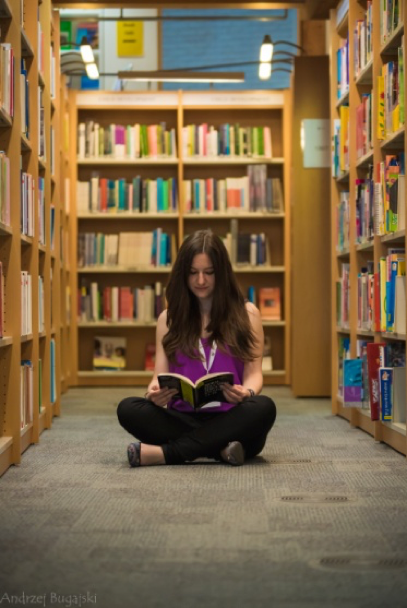
Lina Iordanaki at the Faculty of Education Library. Photo credit: Andrzej Bugajski
You are probably not a PhD student in the Humanities if you don’t spend hours searching for literature relevant to your work, and by extension, if you don’t spend days reading it. You might be in the library of your department, your college room, different cafeterias or in public transport. You might be alone or with colleagues. It might be early in the morning or late at night. Studying is haunting every aspect of your everyday life. Personally, I often have the feeling of missing something. It is like that feeling you have when you leave your house for holidays: as you shut the door, you have the impression that you probably forgot something back in there. If it is your umbrella, it is fine; you can very easily buy a new one at a low cost. But what happens if it is your keys or your passport? There must be a piece of research that I unintentionally ignored, an article that has just been published, a book that is now in the press, which I MUST read and hence, I MUST keep searching and studying.
-
Procrastination
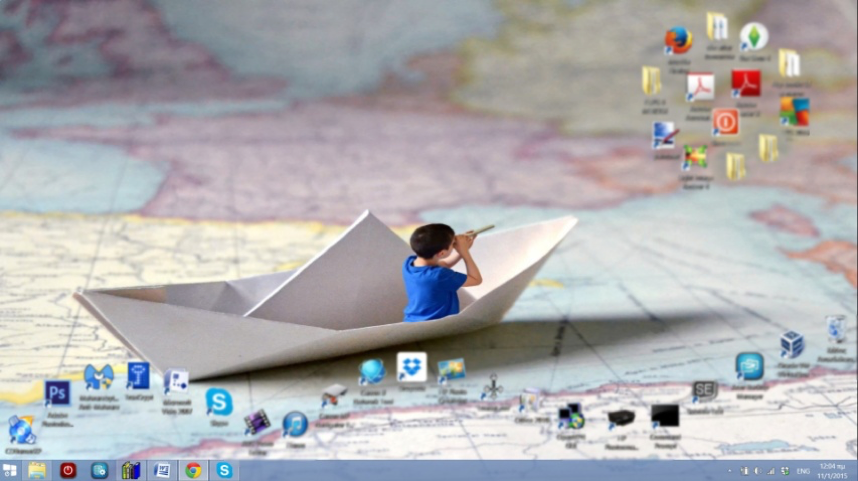
In this vortex of information overload, you need a break. Better two. Maybe three. To be honest, I sometimes struggle with the balance between taking effective breaks and procrastinating. When I am overwhelmed with my research tasks, I suddenly feel the need to tidy up everything, from my room to… my desktop. I should admit that during my PhD, I explored some hidden aspects of my creativity irrelevant to my studies. For instance, would I ever have discovered that the shortcut icons can add an artistic tone to a desktop background if I hadn’t spent hours in front of a screen, writing my literature review?
-
Fieldwork

The most exciting part of my research was visiting schools and interacting with the students there. I brought wordless picture books to groups of 11-year-old children in Greece and England. By observing their reactions and listening to their views, I saw my study from a different angle. It was this period of data collection which gave flesh to my research design and provided answers to my research questions. This is probably why I enjoyed it the most.
-
Conferences
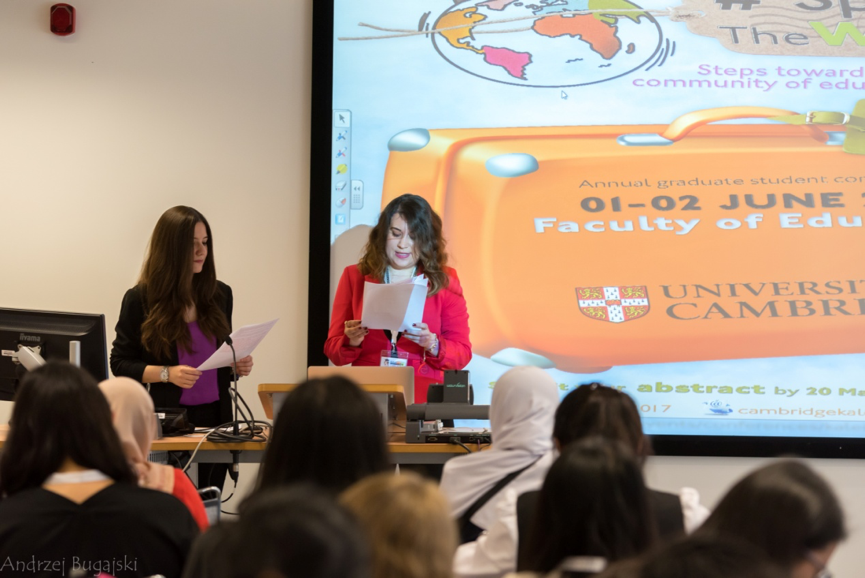
The Kaleidoscope Conference 2017 at the University of Cambridge. Photo credit: Andrzej Bugajski
The best way to “test” your research ideas is to share them with other scholars. I have a story to tell and an experience to remember from every conference in which I participated. I gained confidence talking about my work, met people in my field, broadened my research horizons, and often felt inspired. Conferences even gave me the chance to explore other countries such as Poland and Japan.
-
Writing
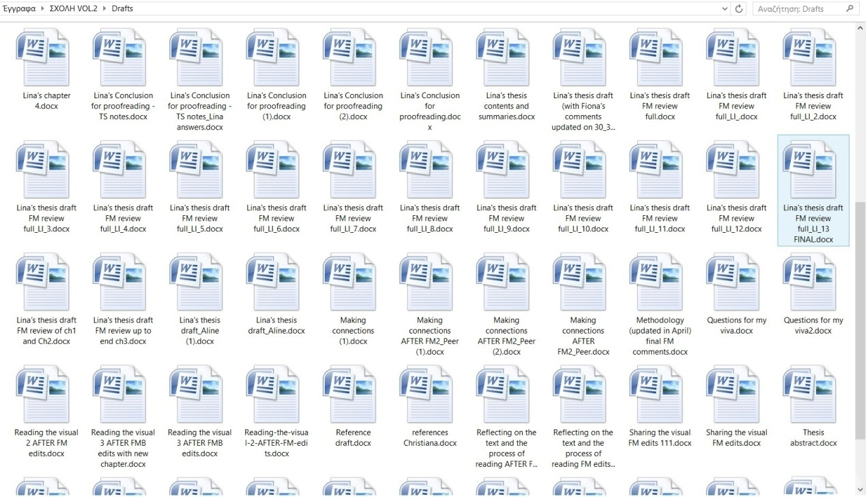
Moving on from the social side of sharing and discussing ideas to the individual task of putting ideas to paper. This picture is an actual screenshot of my computer screen a few days before the submission of my thesis. I save all my drafts so that I can keep track of all the comments I receive and the progress I make. Throughout my PhD life, I gathered more than 95 drafts! Even when I felt I was close to the end, the file “Lina’s thesis” was saved again as “Lina’s thesis_2” and again as “Lina’s thesis_3” and again… as “Lina’s thesis_13.” It seemed like a never-ending process which made me believe that a PhD is more about reworking and rewriting your ideas rather than writing them down in the first place.
-
Submission
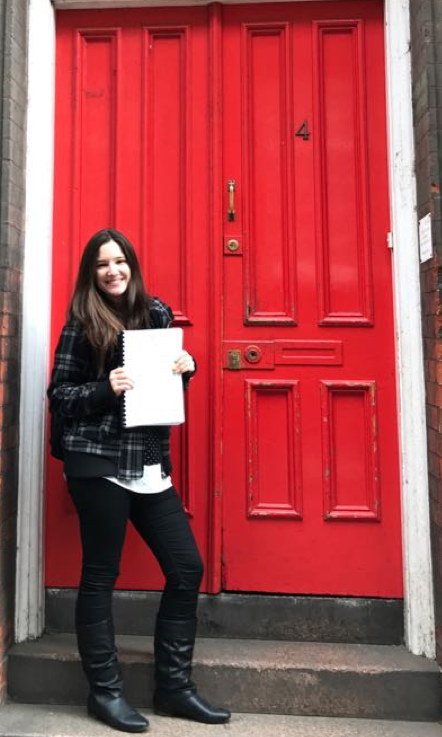
After tons of studying, writing, and rewriting, the day of my thesis submission came. It was truly rewarding for me to be standing in front of the famous red door on Mill Lane holding the hard copy of my thesis, the tangible proof of all my efforts over the last four years. It is not clear from the picture, but I am not posing with the cover of the thesis. I am proudly showing the page of the acknowledgements, the page that comes from and speaks to my heart. This brings us to the next picture.
-
My closest people
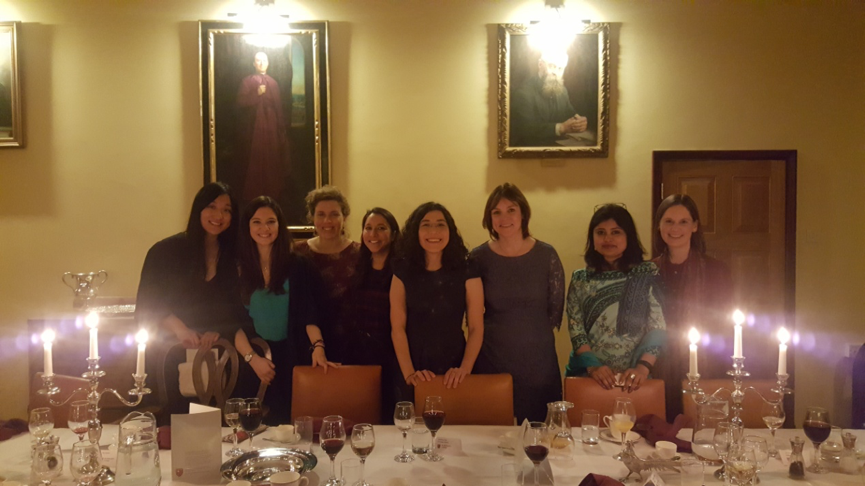
Without the support of my supervisor and colleagues, my family, and friends, I wouldn’t be able to arrive at the final destination of my PhD journey. I shared not only my ideas but also my concerns and my happy moments with them. I don’t know how many times they saw me grumpy and heard me complaining about my work. I will be eternally grateful to them for lending me their umbrella or searching with me for my missing keys and passport.
-
Expectations VS Reality
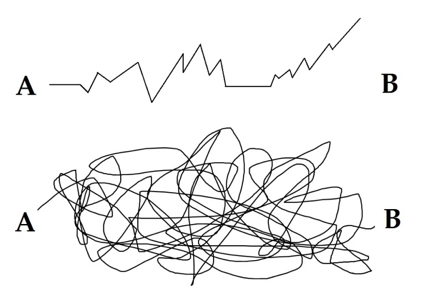
Before I embarked on my PhD journey, I knew that it would not be easy. I was certain that there would be moments of despair and frustration and many ups and downs in both my research and my mood. I expected a graph like the top one in this picture. Reality proved me wrong. There were ups and downs, lefts and rights, diagonals and circulars, a mishmash of trains of thought and mixed feelings. In the end, it worked; I started at A and finished at B, in a unique way. These 8 pictures can offer an insight into my PhD experience, but there are stories that neither words can tell, nor pictures can show. I am sure that your own journey will be exciting as well, full of words, interwoven lines, and memorable pictures.
Lina Iordanaki completed her PhD at the Faculty of Education in 2017 with Dr Fiona Maine. She has worked in Greek and English schools, and recently joined the team of International Board on Books for Young People (IBBY) UK. This story was published on December 9, 2017, on the FERSA Blog run by graduate students at the Faculty of Education in Cambridge (available here) and has been republished here with permission.

Comments
You're looking to give wings to your academic career and publication journey. We like that!
Why don't we give you complete access! Create a free account and get unlimited access to all resources & a vibrant researcher community.

Your Research. Your Life. Your Story.
A magnetic community of researchers bound by their stories





